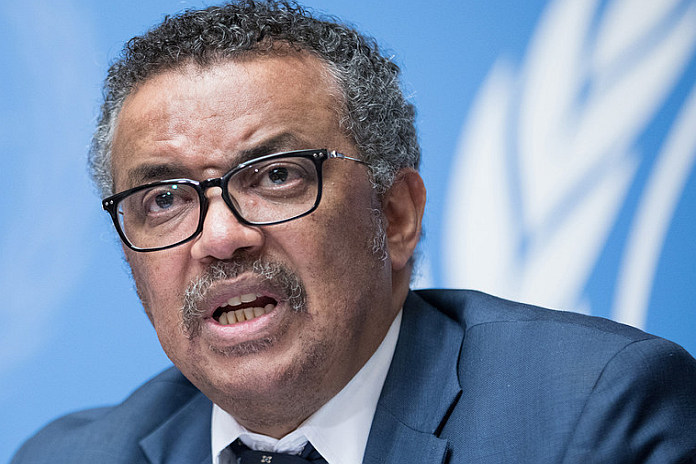By Caribbean News Global ![]()
GENEVA, Switzerland — The World Health Organisation (WHO) director-general Dr Tedros Adhanom Ghebreyesus on Thursday announced that more than 15 million cases of COVID-19 have now been reported to WHO and almost 620,000 deaths.
“In recent years we’ve seen young people leading grassroots movements for climate change and racial equality. Now we need young people to start a global movement for health – for a world in which health is a human right, not a privilege,” WHO director declared.
The director-general explained that although all countries have been affected, “we continue to see intense transmission in a relatively small group of countries. Almost 10 million cases, or two-thirds of all cases globally, are from ten countries, and almost half of all cases reported so far are from just three countries. As we have said previously, political leadership and community engagement are the two vital pillars of the response,” he said.
One of the tools governments can use is the law – not to coerce, but to protect health while protecting human rights.
WHO, the United Nations Development Programme and Georgetown University launched the COVID-19 Law Lab, a database of laws that countries have implemented in response to the pandemic. It includes state of emergency declarations, quarantine measures, disease surveillance, legal measures relating to mask-wearing, physical distancing, and access to medication and vaccines.
“Well-designed laws can help to build strong health systems; evaluate and approve safe and effective drugs and vaccines, and enforce actions to create healthier and safer public spaces and workplaces. However, laws that are poorly designed, implemented or enforced can harm marginalized populations, entrench stigma and discrimination, and hinder efforts to end the pandemic. The database will continue to grow as more countries and themes are added,” WHO director-general said.
But even more powerful than the law is giving people the information they need to protect themselves and others.
“The best way to suppress transmission and save lives is by engaging individuals and communities to manage their own risk and take evidence-based decisions to protect their own health and that of those around them. The pandemic has disrupted the lives of billions of people. Many have been at home for months. It’s completely understandable that people want to get on with their lives. But we will not be going back to the “old normal”. The pandemic has already changed the way we live our lives. Part of adjusting to the “new normal” is finding ways to live our lives safely,” director Ghebreyesus said. “It can be done, but how to do it will depend on where you live and your circumstances. It’s all about making good choices.”
WHO has requested everyone to treat the decisions about where they go, what they do and who they meet with as life-and-death decisions – because they are.
“It may not be your life, but your choices could be the difference between life and death for someone you love, or for a complete stranger.”
In recent weeks WHO said they have seen outbreaks associated with nightclubs and other social gatherings, even in places where transmission had been suppressed; recommends the following:
- We must remember that most people are still susceptible to this virus. As long as it’s circulating, everyone is at risk;
- Just because cases might be at a low level where you live, that doesn’t make it safe to let down your guard;
- Don’t expect someone else to keep you safe. We all have a part to play in protecting ourselves and one another.
First, know your situation:
- Do you know how many cases were reported where you live yesterday?
- Do you know where to find that information?
Second, do you know how to minimize your exposure?
- Are you being careful to keep at least one meter from others? Are you still cleaning your hands regularly?
- Are you following the advice of your local authorities?
“No matter where you live or how old you are, you can be a leader in your community, not just to defeat the pandemic, but to build back better, WHO director emphasised.





